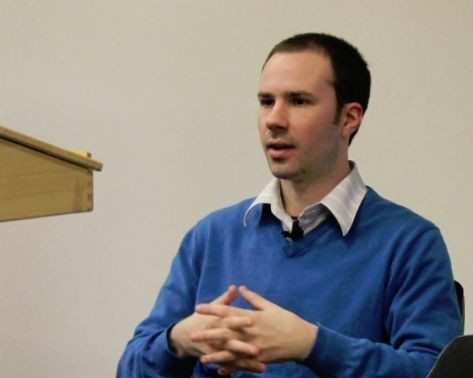
I’ve written a few bits about Bitcoin but it still confuses folks, as was clear from the debate we had about it at the Financial Services Club the other night.
Donald Norman, co-founder of the Bitcoin Consultancy, presented the latest state of play in the currency ...

... and it led to one of the liveliest Q&A sessions we’ve had at the Financial Services Club for some time.
Let’s start with the basics of Bitcoin.
Bitcoin is a fully encrypted, digital currency which, when you have some, can be used globally as easily as cash. It has no central issuing authority and, if you trust it and can use it, means that you can trade anywhere, anytime with anyone, with no interference.
Described as the WikiLeaks of money by some, and as the most subversive development on the internet by others, it’s an interesting space to be involved in and to watch.
Bitcoin must be doing something to catch attention just by the amount of media coverage it gets.
For example, the fact that the tor-based drugs market Silk Road accepts Bitcoins has created plenty of media coverage, but most of this coverage is ignorant, incorrect and misguided.
As swalter718 replies to this PCPro article Paying for your crimes with Bitcoin:
This article was decent, in that it contained honest, factual information about Bitcoin and the Bitcoin network. However, I think its journalistic value and integrity is questionable when continuous links between Bitcoin, and the illicit anonymous marketplace, Silk Road, continue to exist and draw media attention.
The point of swalter718’s comment is that Bitcoin does not fuel crime, just as the internet does not fuel crime.
Crime exists wherever there is commerce and crime will exist in a cash form and in any form online that enables crime to be transacted.
But just because the internet enables links to drugs, gambling and pornography, doesn’t mean that you need to ban the internet.
In the same way, if Bitcoin allows criminals to trade in drugs, gambling and pornography, it doesn’t mean that you need to ban Bitcoin.
And you can’t anyway as, like Wikileaks, Bitcoin is a decentralised P2P service that exists globally through any Bitcoin user’s PC.
Tough.
Live with it.
So what exactly is Bitcoin?
Technically, it’s just an open-source payment tool.
Like BitTorrent - a peer-to-peer file sharing protocol – Bitcoin allows the peer-to-peer sharing of value securely globally.
Here’s a 100 second video primer if you want to understand the concept fully:
Simple.
The problem is that folks don’t like open source P2P services like BitTorrent and Wikileaks as it undermines traditional forms of commerce.
This is why services like Pirate Bay and Megaupload get shutdown, although it’s pretty much impossible to close down fully P2P services like Wikileaks or Freenet.
I could write more, and have already, but the point of writing this blog entry is not for me to debate the pro’s and con’s of Bitcoin but to cover our last Financial Services Club meeting on the subject.
As mentioned, Donald Norman who co-founded the Bitcoin Consultancy, presented the ideas behind Bitcoin for forty minutes. We then engaged in a further forty minute Q&A.

Here’s the recording of the evening, if you have time and interest to want to hear it.
Donald starts his presentation at 5 minutes 45 seconds into the video after an introduction of the Financial Services Club from yours truly (including laptop fail and move of microphone, hence first thirty seconds of Donald's speech has a few sound issues), and the Q&A starts at 37 minutes 45 seconds.
Download the full recording of Donald Norman's presentation [MP4]
Meanwhile, if you can’t spend time listening to this stuff, you can get a good primer in Bitcoin in this series of discussions from Javaworld:
- Bitcoin for beginners, Part 1: The economics and use of Bitcoins
- Bitcoin for beginners, Part 2: Bitcoin as a technology and network
- Bitcoin for beginners, Part 3: The BitCoinJ API
Chris M Skinner
Chris Skinner is best known as an independent commentator on the financial markets through his blog, TheFinanser.com, as author of the bestselling book Digital Bank, and Chair of the European networking forum the Financial Services Club. He has been voted one of the most influential people in banking by The Financial Brand (as well as one of the best blogs), a FinTech Titan (Next Bank), one of the Fintech Leaders you need to follow (City AM, Deluxe and Jax Finance), as well as one of the Top 40 most influential people in financial technology by the Wall Street Journal's Financial News. To learn more click here...

